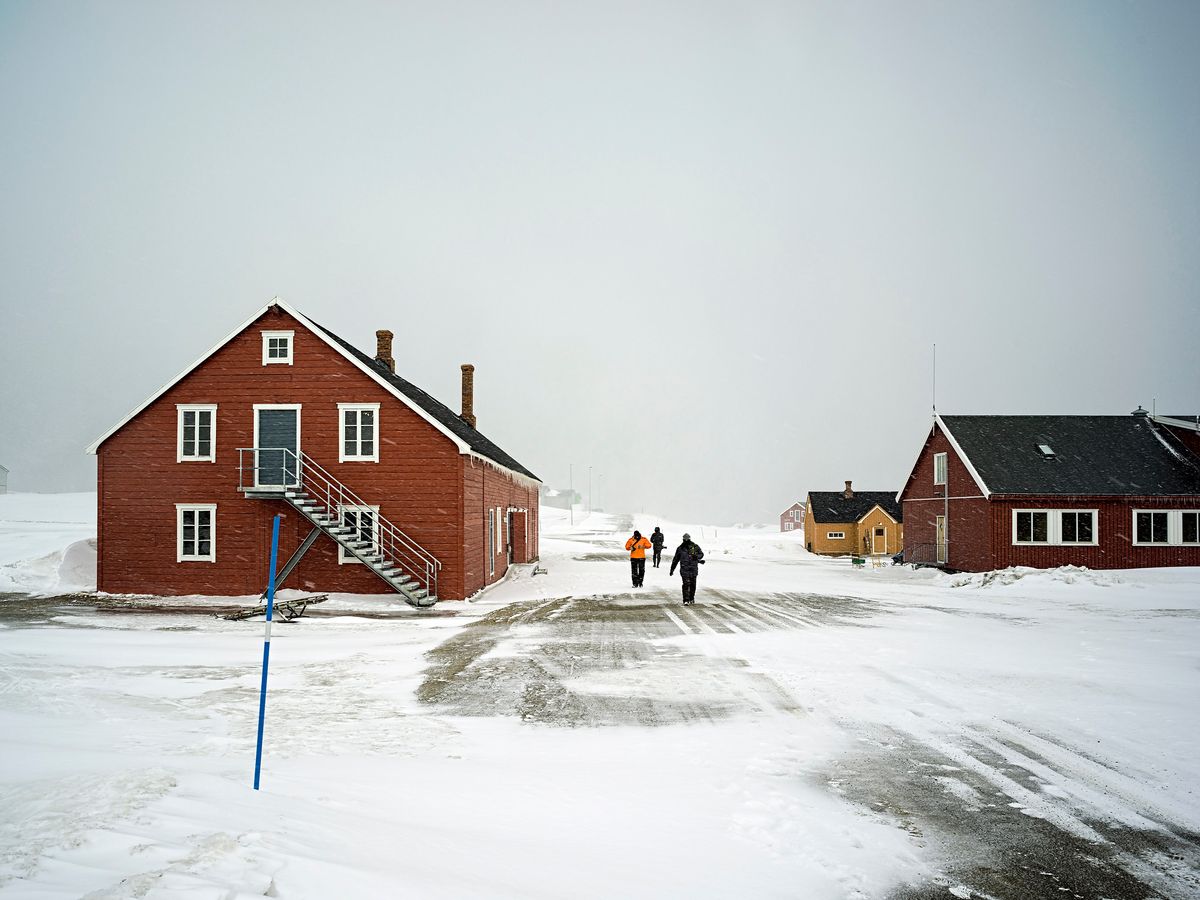Wondermondo 🢖 World 🢖 Wonders of Europe 🢖 Wonders of Norway 🢖 Wonders of Svalbard
Territory
Wonders of Svalbard
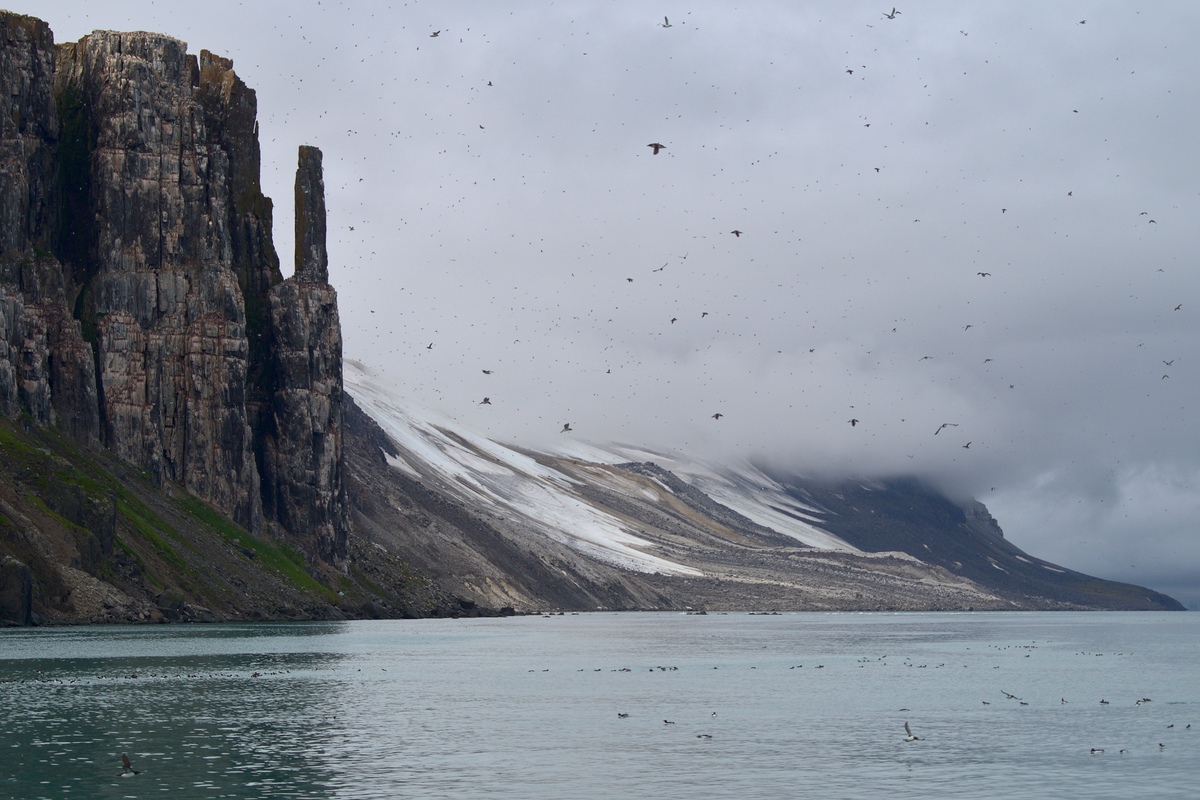
 Highlights
Highlights
The northern archipelago of Svalbard (part of Norway) contains rather many unique landmarks. Most notable are several geological monuments, including the unique northern thermal springs, unique finds of fossils, otherworldly congeliturbates, and above all – the magnificent landscape of Arctic fjords.
Notable monuments are also the numerous subglacial and glacier caves, which often are lighted by deep blue natural light protruding through the clear ice ceiling. Sometimes they may reach considerable size, like Koupaliste Cave (southern Spitsbergen, Austre Trolbreen) which houses a 120 m long and 80 m wide lake, or Glasjologer Cave (Southen Spitsbergen, Werenskioldbreen) with 80 m deep shaft through the ice.
Map with the described wonders
Please add some markers to your posts before using this shortcode.
 Top 18 wonders of Svalbard
Top 18 wonders of Svalbard
Geological wonders
Troll springs
Group of six hot springs that are some of the northernmost in the world. The temperature of water up to 28.3 °C. Springs have formed impressive travertine terraces with pools of different sizes. Part of pools is dry and deteriorating.
Hornsund
Possibly the most beautiful fjord in Svalbard, 25 km long, with up to 1431 m high sides. Contains numerous blue icebergs because in the fiord are ending several glaciers.
Kvadehuksletta
This site contains numerous perfect circle-shaped stone ridges and labyrinth patterns shaped by frost (congeliturbates). Many stone ridges are arranged in long rows.
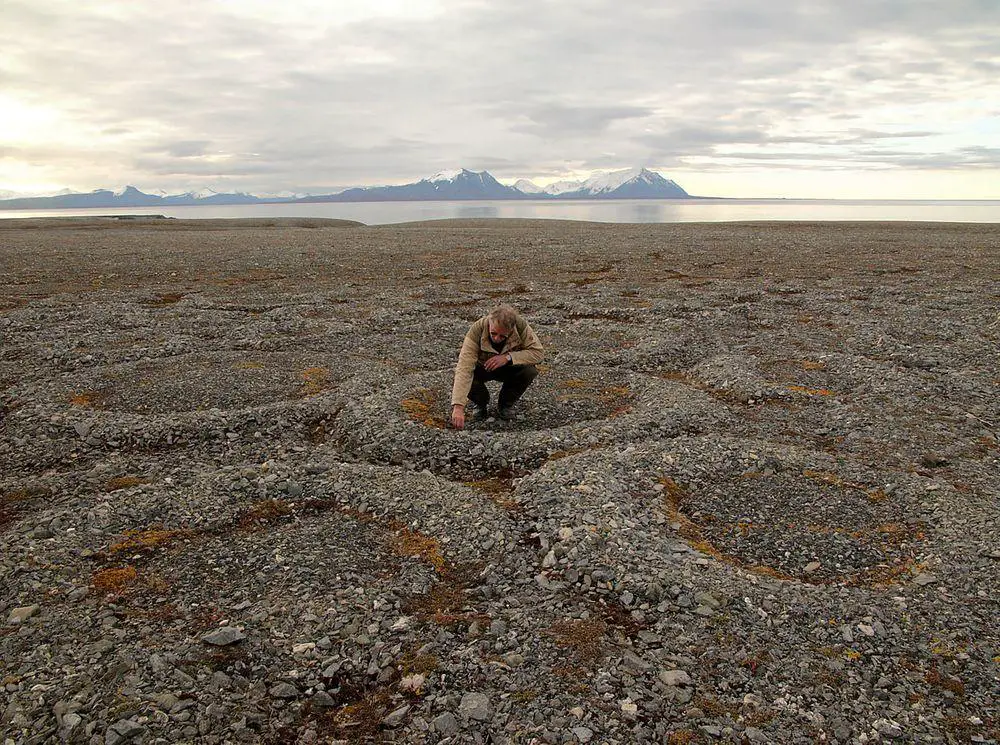
Festningen
At the mouth of Isfjorden, there is an unusual geological formation – a vertical wall that looks like a fortress wall. It is a natural formation of very hard sandstone. The surrounding rock has been eroded and sandstone now stands like a wall, extending into the sea. Footprints of Iguanodons have been found here, although now this part of the rock has collapsed.
Tarantellen
Carbonate rock here has formed an impressive double arch, rock is more than 20 meters high. The rock formation looks like an enormous spider standing on the top of the mountain (750 m).
Jotun springs
Two hot springs north of Troll springs, northernmost hot springs in the world. These hot springs form impressive travertine formations in a form of flat cones, rising 2 – 3 m high. The temperature of water at the surface is 24.5°C.
Strappen
186 m tall dolostone stack rising directly from the sea.
Hyperitfossen
Beautiful waterfall at the Tempelfjord, De Geerdalen. Water falls in cascades over dolerite rock.
Fløtspingo and other Reindalen pingos
Highest pingos in Svalbard and some of the highest open system pingos in the world, up to 42 m high. Pingos are giant chunks of ice covered with soil, open system pingos are basically springs fed by artesian water and frozen as they reach the surface – and thus may contain both ice and flowing water. Pingos of Reindalen most likely contain unfrozen salty water under pressure – there have been reports about up to 60 m high geyser-like spouts of water coming from similar structures further south in Svalbard.
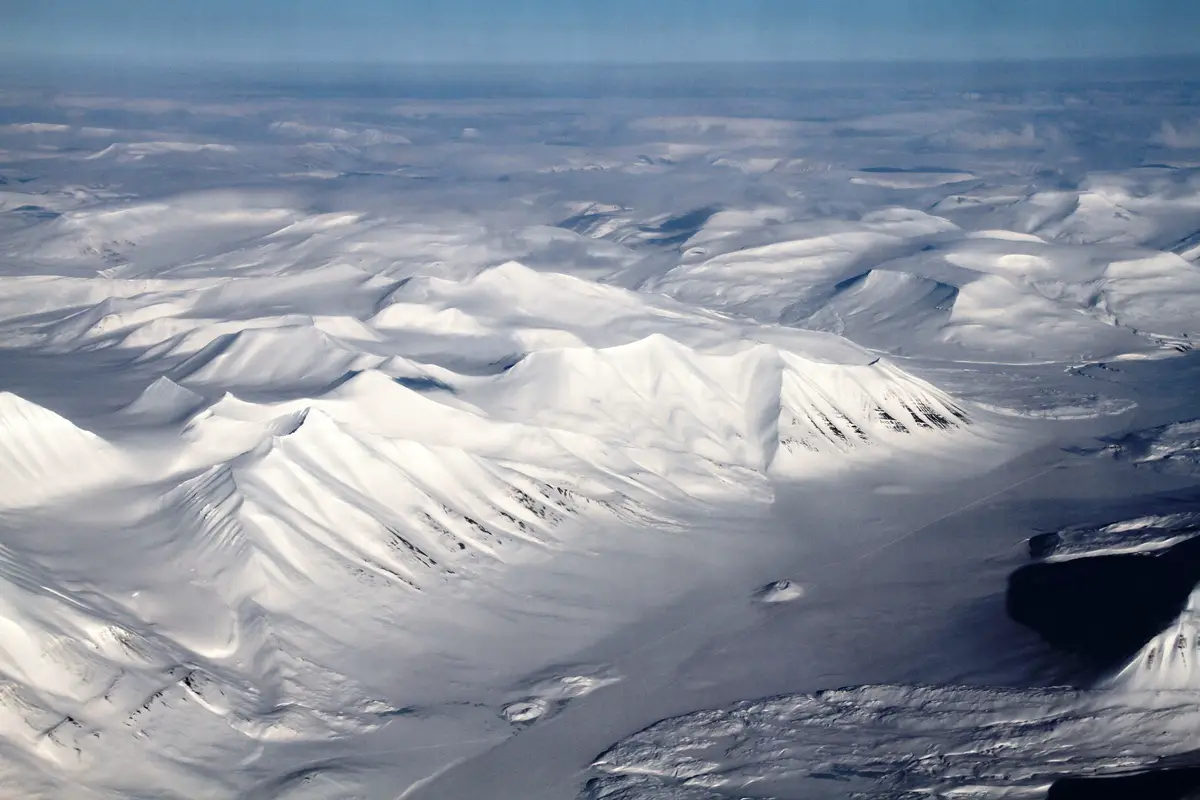
Sylen
80 m tall dolostone stack rising directly from the sea.
Waterfall at the mouth of Dicksonfjorden
Impressive, thin waterfall with several drops. The beauty of this waterfall is accented by the horizontal layering of the cliff circus.
Trollosen of Stormbukta
This is the most powerful spring in Svalbard and it produces 10,000 liters of water per second. Water has formed small canyons towards the sea. To the south is another spring with a smell of rotten eggs.
Tempelfjorden thermal submerged spring
In winter in the middle part of Tempelfjord has been noticed circular hole with abnormally warm water – a possible upsurge of warm springs below the sea level.
Biological wonders
Stappen bird cliff (Fuglefjellet)
Up to 411 m tall cliffs. There live hundreds of thousands of Brünnich’s guillemots, northern fulmars, black-legged kittiwakes, glaucuous gulls, and other birds.
Alkefjellet
Very impressive, up to 100 m tall vertical basalt cliffs (in many locations seen the characteristic hexagonal columns) are inhabited by tens of thousands of Brünich’s guillemots (Uria lomvia).
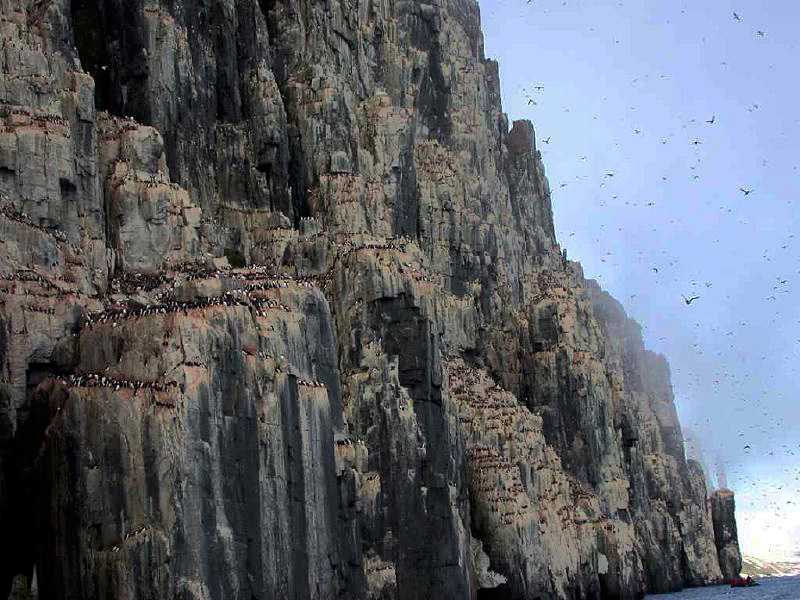
Architecture wonders
Ny-Ålesund
Northernmost active public settlement in the world, located at 78°55’N. Here are living 30 – 35 people in winter, the village was created as a scientific station.
Hammerfesthytta (Tobiesen’s House)
Possibly the oldest usable building in Svalbard – a wooden hunter lodge built in 1822 and 1865-1866.
Svalbard Global Seed Vault
A unique project – the preserve of plant seeds in an underground cavern, serving as a "backup" in a case of the loss of seeds in other gene banks or some global catastrophe. Seeds are stored 120 m deep in sandstone cliffs in secure conditions. Capacity envisages storage of 4.5 million seed samples.
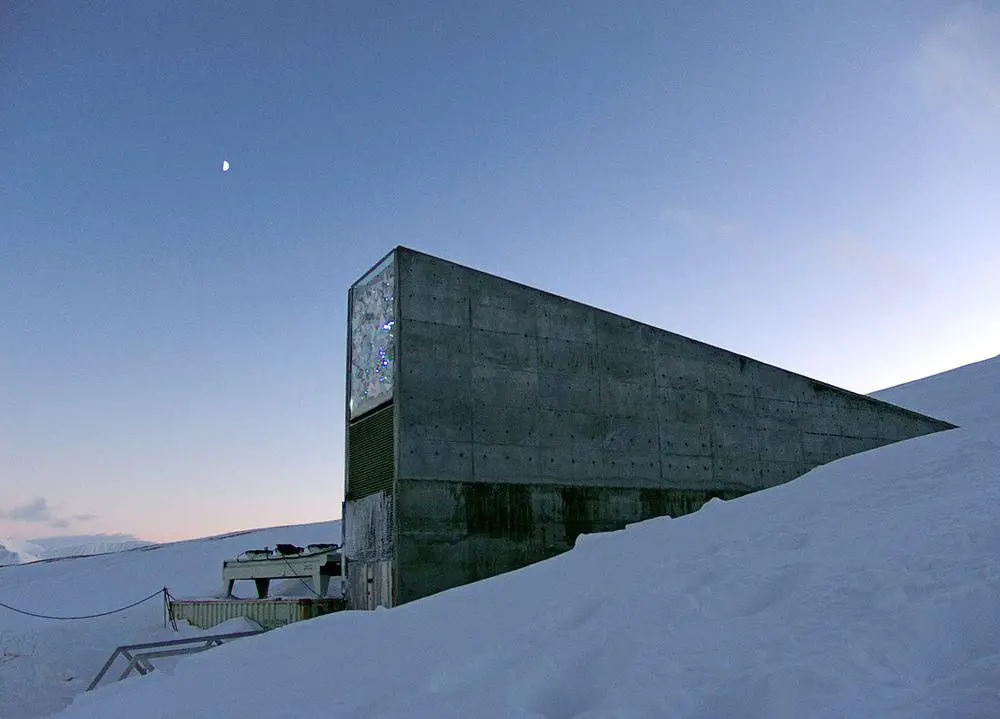
 Recommended books
Recommended books
Svalbard: An Arctic Adventure
A wonderful story about a trip to the Arctic illustrated with magnificent photographs. This book is well organized, and meticulously written. It presents an informative guide to a remote and obviously beautiful part of our planet that many readers have heard of but few have actually visited—or thought of visiting until now. The approachable, friendly style of the writing and the narrative flow seamlessly to the last page. Svalbard does a fine job of bringing to life a remote and exciting part of the world in a short, neatly-packaged travelogue that should appeal to all readers—from avid travelers to armchair travelers to fans of exotic places.
Svalbard, 5th: Spitzbergen, Jan Mayen, Frank Josef Land
There is no other guide to Svalbard. This stunningly gorgeous, seriously remote Arctic archipelago is about as far from civilization as you can get in Europe. Permafrost freezes the ground up to half a kilometer in depth, while winter temperatures can drop to over 40 below zero. Svalbard’s glorious mountains, majestic fjords, and sprawling valleys are the perfect setting for journeys to the back of beyond – by snowmobile, snowshoe, or Siberian husky.

